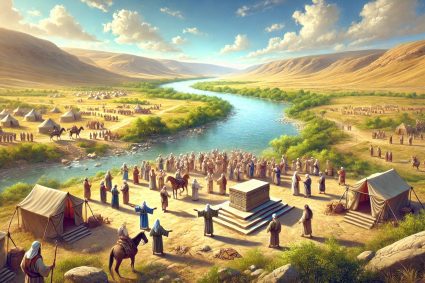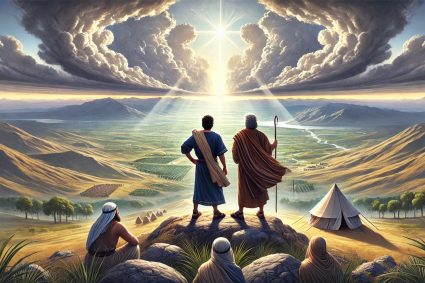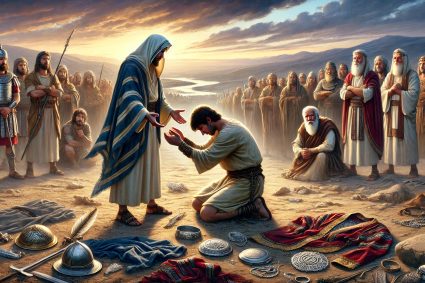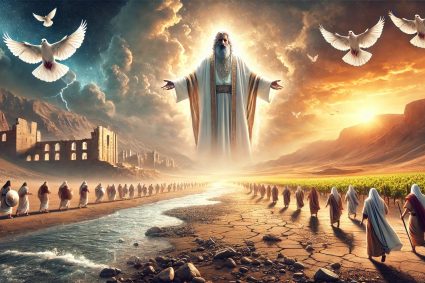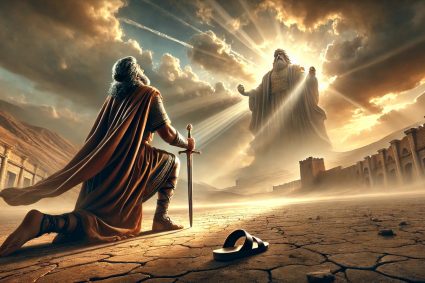
Series EXODUS with Pastor Mark Finley
Lesson 2.The Burning Bush
God Encounters – Moses at the Burning Bush
Lesson 2 brings us to a crucial turning point in Moses’ life. In the solitude of the wilderness, he encounters God in an unexpected way – in a burning bush that is not consumed. This holy appearance is more than a miracle: it is the beginning of God’s active intervention to deliver Israel. Moses is called to stand before Pharaoh with divine authority, even though he feels weak and unqualified. But God reveals His name, His nearness, and His plan. The lesson shows us how God calls ordinary people in their weakness – and equips and sends them with His Spirit.
Content:
2.1 The Burning Bush
God Meets Moses: The Burning Bush as a Turning Point of Calling
The burning bush marks a sacred turning point in Moses’ life. After 40 years in the solitude of Midian, he encounters God in a supernatural way – not with power, but in a humble thorn bush that is not consumed. This appearance shows that God works through weakness and simplicity, yet with holy authority. As Moses removes his sandals, his journey from shepherd to Israel’s deliverer begins. God’s self-introduction as “the God of Abraham, Isaac, and Jacob” reminds Moses of the enduring validity of the promises. This scene teaches us: calling takes time – and God often forms His instruments in secret before using them publicly.
2.2 The Angel of the Lord
The Angel of the Lord – Jesus as the Divine Messenger of Deliverance
In the appearance of “the Angel of the Lord,” no one less than Christ Himself is revealed – speaking to Moses from the burning bush. The term “angel” here does not refer to a created being, but to the divine Messenger who is God Himself. This encounter reveals not only God’s presence but also His compassion: He sees His people’s suffering and intervenes personally. Moses is entrusted with an overwhelming task – the deliverance of Israel. His reaction, “Who am I?” shows deep humility and self-doubt, but also reverence for the divine call. God uses precisely such humble hearts because they rely not on themselves but on His power.
2.3 The Name of the Lord
“I Am Who I Am” – God’s Name as a Revelation of His Presence
Moses asks for God’s name because he wants to know who is sending him – and what he should say to the people. God’s answer “I Am Who I Am” reveals more than a name: it shows God’s eternal presence, reliability, and closeness. “Yahweh” not only means that God exists, but that He is personally involved in the lives of His people. This name stands for God’s faithfulness in the covenant and His care for the suffering. It becomes clear to Moses: the God of the patriarchs is still the same – alive and active today. To call upon the name of the Lord means trusting not a distant deity, but a God who lives among His people.
2.4 Four Excuses
Four Excuses – and God’s Patient Calling
Despite God’s direct call, Moses tried to avoid his responsibility with four excuses. He felt unworthy, feared rejection, doubted his impact, and saw himself as a poor speaker. But God did not respond with anger – instead, He gave reassurance, signs, and support, revealing His patience and care. God’s calling is not directed at the most capable, but at those willing to be equipped by Him. Aaron was given as a concrete helper, but the mission remained Moses’. We, too, may bring our weaknesses honestly before God – and experience how He reveals His strength right there.
2.5 The Circumcision
Obedience Under the Covenant – The Serious Lesson of Circumcision
The incident with the neglected circumcision shows how seriously God takes obedience and covenant faithfulness – especially for someone like Moses, called to lead. Although Moses obeyed the divine call, he had neglected a known duty, which made him vulnerable. God could not use him as Israel’s spiritual leader while he was inconsistent himself. Zipporah’s decisive intervention saved Moses’ life, but it also revealed the urgency of not delaying God’s clear commands. This dramatic scene shows: God is merciful, but also holy – and negligence can be dangerous. If we know what is right but hesitate to do it, God lovingly yet firmly calls us to turn and act.
2.6 Summary
God’s Call from the Fire – Calling, Name, and Mission
In Lesson 2, we meet Moses at the burning bush – a sacred moment when God personally calls him. After 40 years in the wilderness, God reveals Himself as the “I Am” – eternal, faithful, and present. He commissions Moses to lead Israel out of Egypt, despite Moses’ doubts and excuses. God responds to his objections with patience, power, and promises – and even sends Aaron as help. God’s name “Yahweh” shows that He is a covenant God who acts in love. The lesson reminds us: God calls ordinary people with humble hearts to extraordinary tasks – and equips them fully.
(Visited 12 times, 1 visits today)

